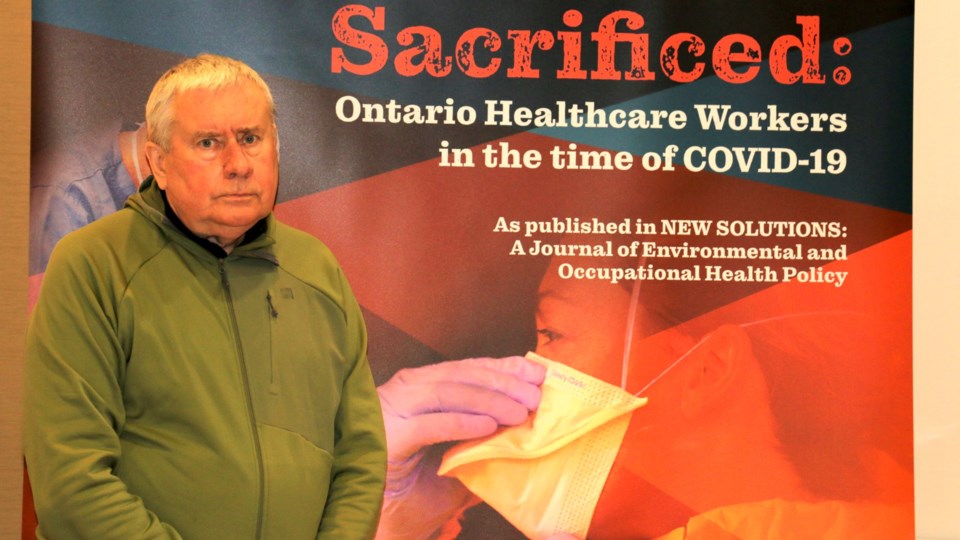A recently released study details the number of Ontario health-care workers who have been infected by COVID-19, and the psychological stress that comes along with being on the frontline of a pandemic.
The 15-page study, titled Sacrificed: Ontario Healthcare Workers in the Time of COVID-19, was authored by Dr. James T. Brophy, Dr. Margaret M. Keith, Michael Hurley and Jane E. McArthur. It was presented by Hurley at a news conference in Sudbury on Thursday morning.
Hurley introduced Brophy and Keith, who he said were the two principal authors of the report and took part in the news conference through an online video connection.
"Health-care workers in Ontario are suffering from much higher rates of COVID infection than the general public," said Brophy. "According to a report published in September, Canada's health-care workers make up almost 20 per cent of confirmed cases."
"While we are all experiencing COVID fatigue and worry, health-care workers are suffering disproportionately from serious psychological distress," Brophy said.
In her comments to the news event, Dr. Keith said not only has the regulatory system failed to protect the workers, but there has also been a failure by some of the joint management-employee health and safety committees, at a time when they are so urgently needed.
"The health-care worker's experience is that the Ministry of Labour is not functioning as mandated, leaving them feeling unsupported and unprotected," said Keith.
She said it was important to note that women make up the overwhelming majority of frontline health-care workers in Ontario. She said a lot of those workers were immigrants, part-timers and in precarious work positions that left them vulnerable to being exploited or losing their jobs.
"They are burning out from stress. They are overworked and have unrelenting fear and anxiety," she added.
"In April and May, we conducted in-depth anonymous interviews with 10 frontline health-care workers from hospitals and long-term care facilities across the province. We talked to nurses, personal support workers, clerical staff and cleaners."
Keith added that the interviews took place in real-time as the pandemic was reaching its highest sense of urgency in the first wave.
Brophy said the findings from the study interviews were consistent with a poll carried out in March by CUPE (Canadian Union of Public Employees) which surveyed 3,000 members.
"The poll revealed that an overwhelming majority believed they were not being adequately protected. Eighty-seven per cent said there was not enough PPE (personal protective equipment) on hand to keep them safe and 91 per cent responded that they feel abandoned by the provincial government," he said.
Brophy said many workers experienced intense anxiety of becoming infected and bringing the COVID virus home with them at the end of their shift.
"A nurse told us, ‘I've come home and cried many times. I am stressed out. I can't sleep at night'," Brophy revealed.
"Fear, coupled with understaffing and increased workload, has resulted in exhaustion and burnout. Ontario's health-care system is underfunded and understaffed. It has the fewest hospital beds and nursing hours per patient in the country," Brophy added.
Another concern is that health and safety legislation does not give full protection to frontline health-care workers.
Hurley said a nurse or a PSW cannot refuse to go into a situation they believe might be unsafe for them personally if it means that a patient or resident urgently needs care.
Brophy explained it in detail saying any health and safety concerns must be declared before a worker engages with a patient.
"If a work refusal might have an implication or endanger a patient for instance, they (health workers) are not allowed to exercise that right at that point. The examples we heard from health-care workers would be things like before they were actually engaged with a patient, or before they went in and cleaned up a room or before they put a person's CPAP machine on in long-term care, they would raise the questions and say I am exercising my right to refuse unsafe work because I am not properly protected," said Brophy.
He said it was interesting to be commenting on Ontario's health and safety laws given that the genesis of those laws came from protecting the rights of hardrock miners in Northern Ontario.
"It is ironic that 40 years after the historic breakthrough that they spear-headed for all workers in Ontario, and really across the country, that we now find in the midst of one of the worst occupational health and safety disasters and crises in modern memory, that these workers have been systematically denied the most basic protections and their legal rights," said Brophy.
It was also mentioned that in many instances Ministry of Labour inspectors have not visited the long-term care homes as they feared for their own safety.
Keith told the news conference that the plea on behalf of frontline workers was a simple one.
Give them what they need to go to work safe and healthy and to let them go home at the end of the day, safe and healthy, she said.



